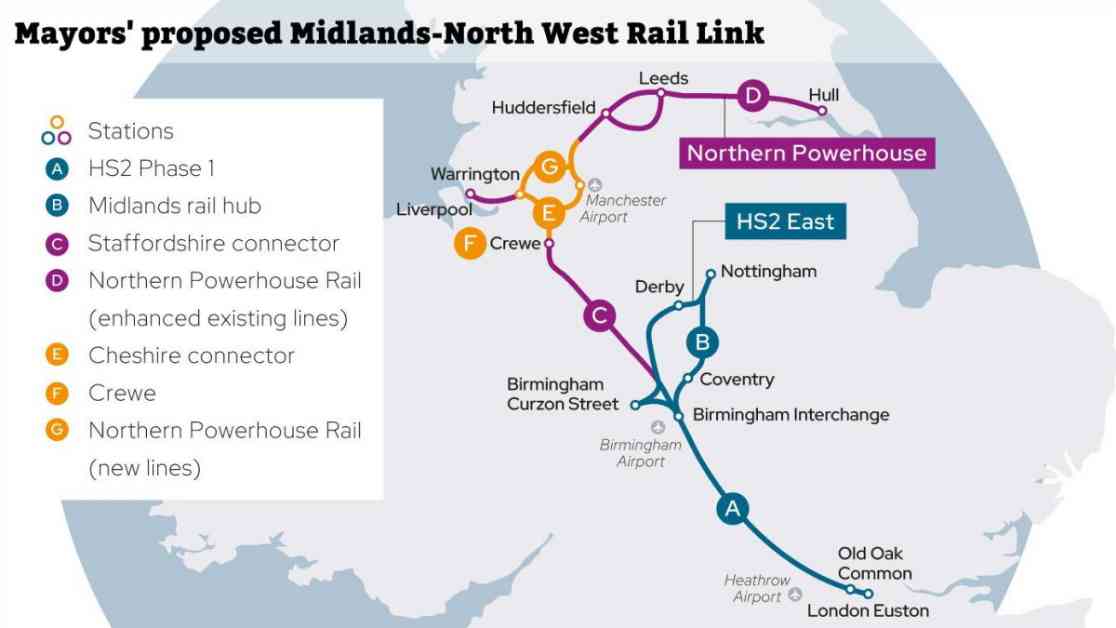Labour mayors in the West Midlands and Greater Manchester are pushing for a replacement for HS2 to be included in the upcoming Budget. They believe that this new rail link could bring in up to £70 billion a year in economic growth to the regions. A recent report suggests that building a replacement to HS2 between Birmingham and Manchester could generate £24 billion in revenue for the Treasury and help alleviate the strain on one of Europe’s busiest rail lines.
The study, commissioned by the West Midlands and Greater Manchester Mayoral Authorities, comes in response to the decision to cancel the northern leg of HS2 last year. The report describes the replacement as a “golden opportunity” for the new government to invest in infrastructure that will benefit the regional economies. The proposed Midlands-North West Rail Link would cover 80km (50 miles) between the two cities and deliver 85% of the benefits of HS2’s cancelled second phase at a fraction of the cost.
The plans for the replacement rail link have been put forward by a private consortium led by engineering giant Arup. They suggest building the new rail link on the same route as HS2 phase 2 but at a lower specification and in incremental stages to reduce costs. The proposed trains on this route would run at speeds of around 185mph, slightly slower than the 225mph speeds planned for HS2 trains between London and Birmingham.
Despite the slower speeds, the report indicates that journey times between London and Manchester would only be 15 minutes longer than the original HS2 proposals. The economic assessment of the project suggests that the West Midlands and Greater Manchester economies could see a significant boost of £40-70 billion if connectivity is improved with the new rail link. This would bring them closer to the UK average or in line with peer cities in Europe such as Lyon in France or Düsseldorf in Germany.
Former chair of HS2 Ltd, Sir David Higgins, who authored the report, emphasized the need for collaboration between the government, business community, and combined authorities to make the new rail link a reality. While ministers have ruled out reversing the cancellation of HS2 phase 2, they have expressed openness to considering proposals for a replacement line. Industry sources suggest that the replacement is a priority for Transport Secretary Louise Haigh.
The King’s Speech also highlighted the government’s commitment to addressing the productivity gap in the north of England through transformative infrastructure investments. The report does not provide a specific cost estimate for the new project but recommends maximizing private sector financing with government support. It calls for the government to engage global investors to deliver the necessary private finance, as has been done in other countries like France and Spain.
The proposed rail link would utilize traditional ballasted track instead of the more expensive concrete slab track required for high-speed rail, resulting in lower costs. The report estimates that the project could save the taxpayer £2 billion by reusing existing land, powers, and design work secured through public funds for HS2 Phase 2. Andy Burnham, Mayor of Greater Manchester, stressed the importance of improving rail capacity and connectivity between the North and the Midlands to support economic growth.
West Midlands Mayor Richard Parker echoed this sentiment, emphasizing the significance of additional rail capacity for the region’s development. Former Conservative West Midlands Mayor Andy Street, who was instrumental in commissioning the report, expressed the need for early decisions to end uncertainty and move forward with the new rail link. Both mayors are prepared to collaborate with the government and business community to build a modern railway network that connects people, communities, and businesses.
In light of the potential economic benefits and increased connectivity that the replacement rail link could bring, there is growing pressure on the government to consider the proposal seriously. The mayors and private sector consortium behind the project are eager to see it included in the Budget to kickstart the feasibility study and move closer to implementation. With support from various stakeholders, including industry experts and local authorities, there is optimism that the new rail link could be a game-changer for the West Midlands and Greater Manchester regions.













